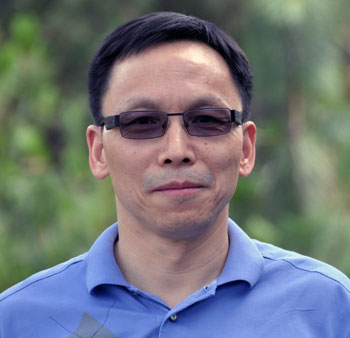Delegates highlight how changing forest environments affect water resources

Adam Wei, professor of forest hydrology and ecology with UBC Okanagan’s Irving K. Barber School of Arts and Sciences, is co-organizer of the upcoming International Conference on Forests and Water in a Changing Environment. The conference takes place at UBC Okanagan July 6 to 9.
Scientists from around the world will be in Kelowna next week to talk about water quality and availability, forestry and aquatic ecology as UBC’s Okanagan campus hosts the International Conference on Forests and Water in a Changing Environment.
The conference, held every three years, provides an opportunity for international scientists to gather and share their research and exchange ideas, says conference chair Adam Wei.
The goal is to provide an opportunity for experts who specialize in forest hydrology, eco-hydrology, geomorphology, watershed management, and climate change in forested environments to connect and share their knowledge.
Wei, an Earth and Environmental Sciences professor with UBC Okanagan’s Irving K. Barber School of Arts and Sciences, says this is the fourth-ever international Forests and Water conference and the 2015 focus is all about forest disturbance and hydrological processes in a changing environment.
“Forests play a vital role in sustaining water resources and aquatic ecosystems,” says Wei. “Forest disturbance, from natural events — like wildfire, insect infestation, disease, or even windstorms — and human-caused disturbance including timber harvesting and land conversion, can have a profound effect on hydrologic, geomorphic, and ecologic processes.”
The conference includes a full-day tour that will take participants on a trip past local lakes, through grasslands, and a variety of forest types to the Upper Penticton Creek experimental watersheds. Along the way, they will witness the effects of fire, insects, logging, and other disturbances in the Okanagan Valley. The tour will also stop at the Okanagan River dam, where water supplies and international water agreements will be discussed.
“Our understanding of hydrologic and ecologic response to accelerated environmental and land use change is key to the development of adaptive and mitigating strategies to ensure the continued security of water supplies and ecological values,” says conference co-chair Rita Winkler, Forest Hydrologist, with the BC Ministry of Forests Lands and Natural Resource Operations.
The conference has attracted top researchers from around the world, says Wei. Along with keynote speakers from Europe, Australia, China, Canada and the United States, a number of oral presentations and poster displays will be offered by scientists and students. Wei expects more than 200 delegates from more than 20 countries at the conference, which runs July 6 to 9.
“I am happy that this conference has caught the attention of world-leading scientists, who will talk about how forest changes affect water resources and how we operationally manage those effects,” adds Wei.
Conference Themes
- Natural and human disturbance effects on hydrological processes (water quantity and water quality) in forested watershed at different spatial scales
- Climate variability, forest changes and hydrologic responses
- Reforestation and hydrological processes
- Forest carbon and water coupling across different spatial scales
- Applications of new methods, models and technologies
- Integrated watershed assessment and management
- Emerging topics: the effects of forest changes on surface water and groundwater interaction, and application of landscape ecology on watershed hydrology in forested watersheds
More information can be found at forestandwater2015.com.
— 30 —